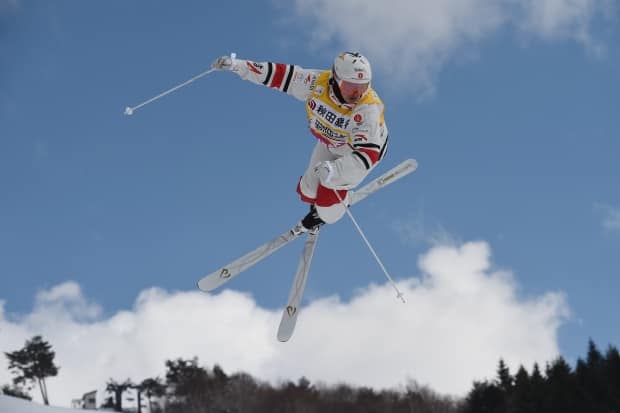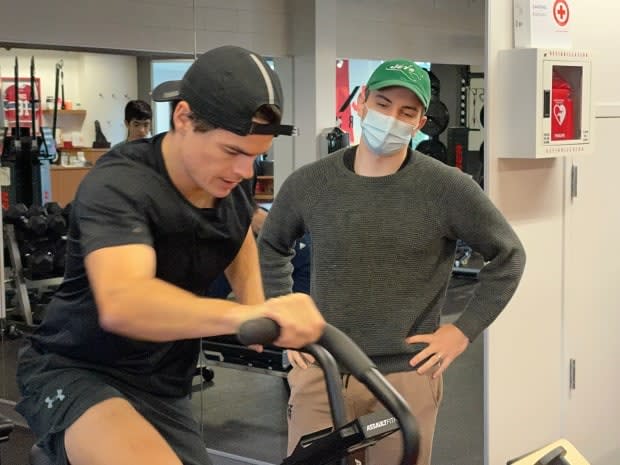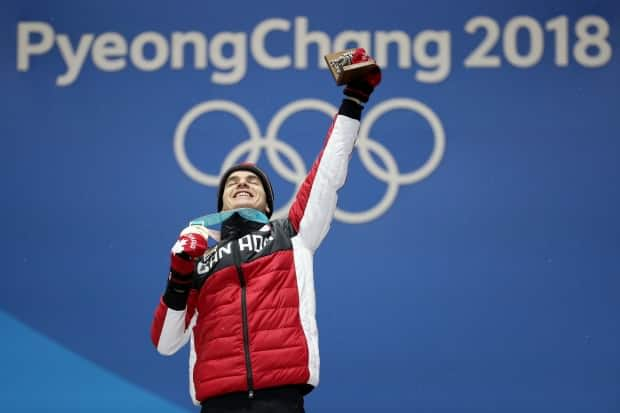Inside the mind of Canada's Mikaël Kingsbury, the greatest moguls skier in history

Mikaël Kingsbury starts tapping on his steering wheel, the sun splashing across the dash of his electric Volvo, as if he's a drummer in a band.
There's no music, only the pitter patter of his hands. He first starts slow, a methodical rhythm — left, right … left, right… left, right … before he starts speeding up.
Driving down the freeway after a training session near his home in Deux-Montagnes, Que., near Montreal, the 2018 Olympic moguls champion is explaining how he approaches and executes every race he competes in.
"This is when I'm about to hit the first jump," he says, closing his eyes for a brief second while driving, becoming almost meditative, as if he's going down the hill.
He continues, for exactly 23 seconds, a golden soundtrack of a perfect run.
"I never listen to music when I'm skiing. I listen to the noise of my skis. It's like a drum solo," Kingsbury says.
He starts tapping his steering wheel again, getting ready to go through another run.
"You know when you land the first jump the rhythm sounds like this." Left, then right with his hands again. "I'm hitting the bottom air now. It gets into your head and into my body and you know if you follow that rhythm you're right where you need to be."

'It's like a drumbeat'
It's this precision, this mental edge, this visualization the 29-year-old believes is part of what sets him above the rest.
He's finishing explaining a second run down the hill.
"That was a little shorter. The middle section takes about 15 seconds," he says. "It depends on the course. Sometimes the courses are different and I have to change up my rhythm a bit."
He's tapping on his steering wheel again, this time changing the cadence.
"A tight course will be faster. It's like a drumbeat."
And then he throws his hands up, taking them off the steering wheel quickly, as if he's celebrating another golden run, something he's done a record 65 times on the World Cup circuit and once on the biggest stage at the Olympics.
Kingsbury's success in the sport is jaw dropping. He has 93 podium finishes, he's won the world championship six times and has 18 Crystal Globes —including nine straight for overall moguls winner in a season.
WATCH | An insatiable appetite for winning:
It seems everything about Kingsbury's life has been preparing him to be the most dominant moguls skier in the history of the sport.
In his hometown and home province, Kingsbury is a celebrity. Trips to the ski hill or grocery store take longer than normal. He's bombarded by people who notice him and want a selfie or autograph.
"I don't dress in my Team Canada gear when I go skiing with my friends because I get stopped for photos," Kingsbury says.
He basically grew up on skis at his family's cabin near Saint-Sauveur, just north of Montreal, not far from where he grew up and the same place where he would make his moguls debut at the age of eight. That cabin was only a couple of doors down from Alex Bilodeau, who also turned out to be a Canadian moguls star, winning Canada's historic first gold medal at the Vancouver Games in 2010.

'Je vais gagne'
Kingsbury and Bilodeau became close friends, a relationship that proved mutually beneficial as they grew in their careers together and reached the pinnacle of their sport.
"We were pretty much neighbours," Kingsbury says. "When I was eight, he told me how to train. We grew up on the same ski slope. Had the same coaches. I was eight, he was 13. To train with people like Alex, who went on to win the Olympics, was incredible."
His Olympic dream was sparked in 2002, when a nine-year-old Kingsbury was at home watching the moguls competition at the Salt Lake City Olympics. His father, Robert, recalls his son getting up in the middle of the competition and going to the computer room.
"I wasn't sure what he was doing but later that night I saw the sign above his bed. He put it on the ceiling," Robert says.
Kingsbury had printed out a photo of the Olympic rings with the words "Je vais gagne" [I will win] underneath them. Every night before falling asleep he would look up at the sign, dreaming of one day winning gold.
"I was telling him about visualization before all of that," Robert says. "When you visualize something you can achieve it. And he does that today."
Even as a teenager, Kingsbury relished a challenge. In his early days of competition, he had detractors, people who said he probably wouldn't be able to keep up with the older kids who were more skilled and had more experience.
I was 15 and beating 23-year-old people. At that moment, I felt confident. I loved beating the older guys."
- Mikaël Kingsbury
"When I was 13 years old I knew I had something special but wasn't sure how good I could be," he remembers. "Then when I was 15, I did my first North American Cup. It was the first time I was doing an international event. I was 15 and beating 23-year-old people.
"At that moment, I felt confident. I loved beating the older guys."
Kingsbury's progression hasn't been meteoric; he didn't come out of nowhere to burst onto the moguls scene. Instead, he says he used every step along his career to get the most out every opportunity. It's been a steady and consistent climb to the top.
"The hardest years were those early years. Like [age] 15 to 18. The step from the lower levels to the big level. That was hard," he says. "I was always using the little opportunities I had to get to the next level. I didn't skip steps but I went through them fast. Every time they have gave me an opportunity I was jumping on it. I gave them no choice but to keep giving me chances."
Kingsbury's mother, Julie, says it's been her son's attention to detail that has allowed Mikaël to excel in his sport.
"When he likes something he focuses on the details," Julie says. "And he loves skiing."
Both Julie and Robert burst with pride when they talk about Mikaël, a small concession of celebration for a family more used to humility.

'We want gold'
"We're very simple people who love what they do. I'm grateful every day for what I have," Julie says, flashing a smile that lights up their living room. "I don't need big things. I have everything. I have three kids who are healthy. I have a husband who loves me. Good work. I'm very happy.
"At the Olympics, we're all parents at the bottom of the hill. Each time it's our kid, whatever they do the parents are stressed and we want the best for our kids. We want our kids to be happy. That's all that matters."
But make no mistake, Robert and Julie love watching Mikaël stand on top of the podium.
Inside their Deux-Montagnes home, there are 18 Crystal Globes on full display representing every World Cup win — an unforgettable and remarkable visual representation of just how dominant Kingsbury has been.
The sun is pouring through the westside windows of their home and hitting the brilliantly shiny globes, blasting light all over the room like multiple disco balls.
"There's a lot of work. I have to dust all of them all of the time," Julie says. "I'm a good globe keeper. It's a lot."
There's a lot of work. I have to dust all of them all of the time. I'm a good globe keeper. - Julie Thibaudeau on keeping her son's trophies clean
Robert is watching his wife look at all the globes, all that winning.
"During the time he stays here living with us, the globes stay here. But when he gets his own place, they'll go with him," he says.
And they both want their son to add to the collection.
"We want what he wants," Julie said.
Kingsbury, eavesdropping from the other room, chimes in.
"We want gold," he says, laughing.
"We want gold," says Julie.
Kingbury doesn't mind living with his parents for now. Everywhere he needs to get for his training is less than 30 minutes from the family home he grew up in.
But plans are underway for him to build a new home north of where he is right now with his parents — a place for him and his girlfriend, Laurence Mongeon, to live.
"I want to be at home more. I bought a trampoline for my backyard, I'm going to try and put it underground," he says. "I bought a squat rack. I'll make a gym at home so I'm spending less time on the road."
While most Olympians depend heavily on government funding to train, travel and survive day-to-day, that isn't the case for Kingsbury.
His star power has allowed him to garner a laundry list of more than 11 major sponsors that allow him to live a more than comfortable life. Take for instance his new wheels, supplied by Volvo Cars Canada. His workout gear is provided by Under Armour Canada. Auclair looks after Kingsbury's ski gloves.
Now Kingsbury has his sights on a new home. He's still looking for a contractor to build the house but his hope is that he's in it with Laurence sooner than later. Because here's the thing about Kingsbury, despite his intense commitment to training and his sport, balance is more important.
Throughout his entire career, Kingsbury has prioritized family and friends over anything else — something he believes has led to him still being in love with skiing today.
"I wouldn't be as good if I didn't have balance and fun," Kingsbury says. "I've always had balance. When I'm at home, I like to live like I'm a normal person. Like a 21-year-old who just went to his first Olympics."
For as balanced as his life may seem, Kingsbury is as disciplined as it gets.
He spends five days a week training at a location called Hockey Etcetera — a state of the art complex with a fitness centre, ice rinks, pools, ice baths and saunas.
"I enjoy the lifestyle of going to the gym, eating well and feeling good. I wake up with energy and feel good," Kingsbury says. "I have energy and stamina."

Trains with NHL stars
He's also surrounded by elite athletes at the training facility. During this past summer, hockey stars — and likely Team Canada teammates in Beijing in February — such as Sidney Crosby of the Pittsburgh Penguins and the Edmonton Oilers' Connor McDavid trained at the complex. Kingsbury, a massive hockey fan, didn't get to lace up his skates with them but was watching closely.
"I didn't get to skate with them but I did some of the drills they did. It's great cardio," he says. "I train often with Kris Letang. It's a really cool set up here."
Letang, who was born in Montreal, is a three-time Stanley Cup champion with the Penguins. Kingbury and Letang use the same trainers for their strength and mobility workouts during the summer. Letang, who has spent his entire career in close proximity to Crosby, one of the hardest-working superstars in sports, sees the same dedication to greatness in Kingsbury.
"Two words: Precision and perfection. That's basically his M.O.," Letang says of his training partner. "He trains to be perfect in every aspect of his training.
"Whether it's cardio, or movement, or strength, he's just precise with everything he does."
Keeping his body in peak form at this point of his career is a full-time job for Kingsbury and his team.
Athletic therapist and strength coach Marc Nadeau has been working alongside Kingsbury for the past five years.
Mik has high standards. We can't be fooling around or making stuff up with him. We have to bring our 'A' game every day. - Marc Nadeau, Kingsbury's athletic therapist and strength coach
"Mik has high standards. We can't be fooling around or making stuff up with him. We have to bring our 'A' game every day," Nadeau says in between sets, encouraging Kingsbury as he pedals faster on a stationary bike.
"He's always ready to go. That's what makes the difference, especially when you compound that over time. When you look at someone else who maybe takes that Thursday or Friday off over 10 years, it starts to add up. That creates a big gap. He has the talent to pair with the work ethic."
Kingsbury's time in the gym now is focusing on power, agility and quickness, many of the movements relating to his sport.
Occasionally, Nadeau and the other trainers throw in strength training to "build the body and provide him with the armour his body needs to stay robust," Nadeau explains.
Kingsbury gets off the bike to jump into the conversation.
"I need to stay light up top," he says, breathless. "I won the Olympics at 147 pounds. Now I feel I'm better at 150. I got up to about 16 pounds this past summer."
That's how precise Kingsbury is. "You know how people shed for the summer, I bulk up in the summer and shed for the winter," he adds.
After a couple of hours at the gym, Kingsbury then heads to trampoline practice, a 20-minute drive away. Inside, bright purple and yellow walls greet the Olympic champion. This is a place clearly meant for children.

'I like bouncing'
Kingsbury first started coming to this same club when he was eight years old.
"I like bouncing. And I liked jumping into the foam pit," he says. "This was my first job and pretty much the only job I've ever had outside of skiing. I was 15 years old. My mom would drop me off here and I would teach summer camps."
He's only started coming back to this trampoline club recently, reintroducing the fun back into his training.
"I missed this place," Kingsbury says, looking around at the vast room with a trampoline at the back.
But for as much fun as it is to bounce around like a kid again, this training is now a crucial part of Kingsbury's preparation for another Olympics.
Dean Bercovitch is a former national team member and now Kingsbury's air coach. He says the trampoline training provides valuable simulation training for what it's like to launch off a jump while barreling down a hill on skis.
"We try to relate it to a jump on the snow. How fast the trampoline goes down and shoots you up is very similar to the timing of a jump. Small and quick. It's the most realistic platform you can use," Bercovitch says.
He talks of "off-axis skills," a new way of doing acrobatics mixed with traditional strategy.
Bercovitch gets Kingsbury to bounce off the side of his back or stomach to create an off-balance situation and then gets him to practice one of his jumps.
"What we really need are single flips that are really precise," Bercovitch says. "I call it transition time simulators. Transition is what the scoop is before you take off for air. So on the trampoline the scoop is when you're lifting. The transition is that scoop. If you can simulate the timing of the scoop on the apparatus you're training on, there's a better chance you can perform it on demand in competition."
Kingsbury sees the immediate benefits.
"I'm trying to keep the same vision as I would on the snow. I'm skiing moguls. I don't arrive at a jump in perfect balance. I'm arriving with my chest down, body off-balance. This is about changing the body position," he says.
"It's good for me to put myself in uncomfortable situations and try and get myself comfortable. It's the muscle memory of knowing how to adjust my body immediately."
I'm a salesman. Some of the runs I win, there are many mistakes that I'm aware of but nobody sees it. Judges and people at the bottom have no idea. - Mikaël Kingsbury
And it's about making split-second decisions in mid-flight without the judges noticing.
"He's the best in the world at that. Probably in any sport. He's hiding it and selling it," Bercovitch says.
Kingsbury again jumps into the conversation.
"I'm a salesman," he says, smiling. "Some of the runs I win, there are many mistakes that I'm aware of but nobody sees it. Judges and people at the bottom have no idea."
There's a joy Kingsbury exudes as he's bouncing and flipping around on the trampoline. He loves this and it's clear he wouldn't want to be doing anything else.
"I care a lot. I don't want to say I care more than everyone about the sport but I prepare myself very well," he says.
Kingsbury also has an unquenchable appetite to get better every single day, which has allowed him to have a consistency of greatness that no other athlete has been able to duplicate in his sport.
"I train like I compete. I'm very competitive. Every time I put my skis on I try to win the day. And build off those little wins. If I can win every training, why can't I win every race?" he says, matter of factly.
For as humble as he is, he's not afraid to speak about the confidence he has when it comes to his training and skill.
"When you're the one leading the way, the people are always trying to catch up," he says. "I feel the way you want to pass me is by trying something different. I feel like some countries try to do what I do. But I'm going to be better than I was yesterday. You're always going to be a day behind."
Back in his electric Volvo after hours of training, Kingsbury starts heading back home.

Gold-medal run
He starts talking about his gold-medal run on a chilly February night at the Bokwang Phoenix Park ski hill in Pyeongchang, one of the greatest nights of his life.
"I remember starting to feel the vibration in my body when I was doing my warmup," he says. He was playing a Mobb Deep song, Shook Ones Part 2, from the opening of the movie 8 Mile as he was going up the chairlift.
"That's when I knew I was going to win. I felt so good. It's not the best song ever but at that moment, I knew it."
He plays the song over as he drives down the freeway, being swept away back to that golden night.
"The run is hard to remember. I remember some of it. The thing I remember most is crossing the line."
As he continues remembering parts of that night, including hearing the joyous screams of his mother waiting at the bottom of the hill, Kingsbury interrupts himself.
"Welcome to my city. That's me welcoming everyone," he says, pointing across the road.
A larger-than-life sign is on the side of the road about two minutes from Kingsbury house.
It's him, welcoming people to Deux-Montagnes.
"I'm an ambassador for the region here. That's me with the apples. There was another picture on there before. It was me smiling. This one I'm a bit more chill," he says.
It's a perfect representation of where he is at in his life — a little calmer, more present, and skiing freer than any other point in his career.


